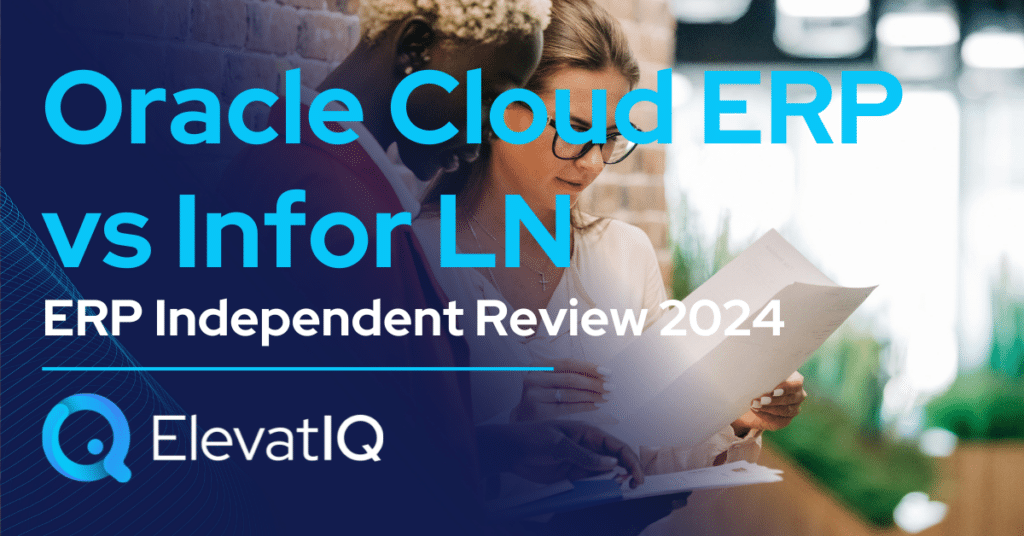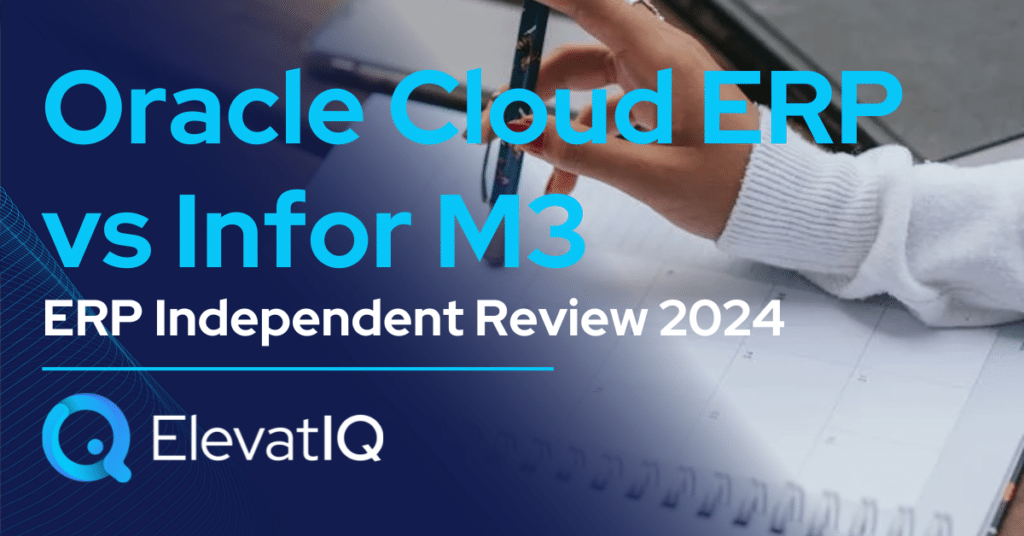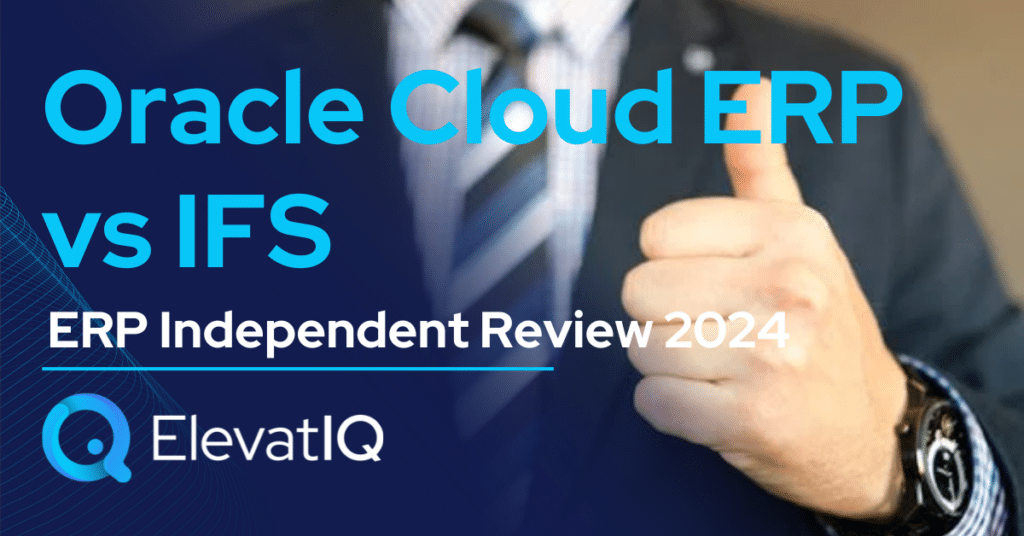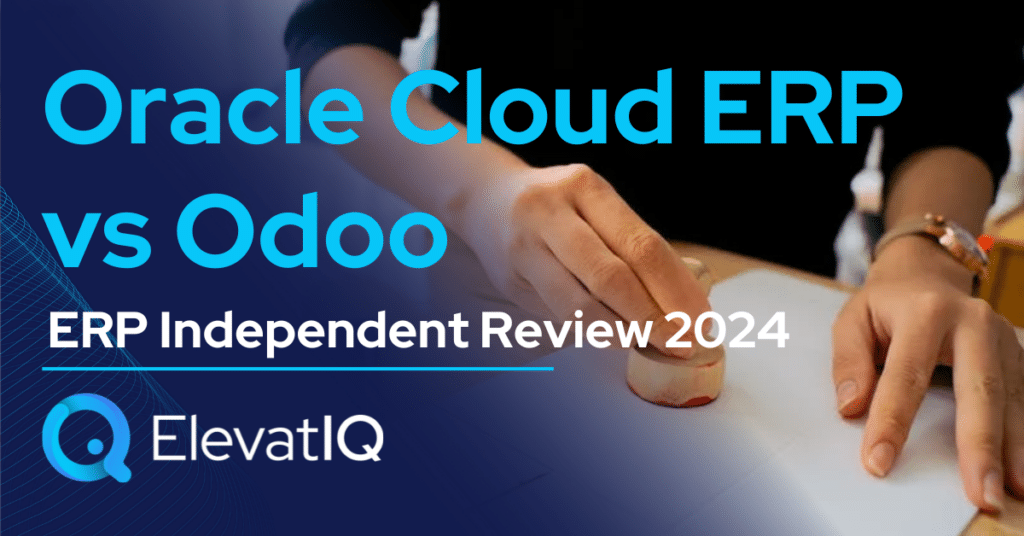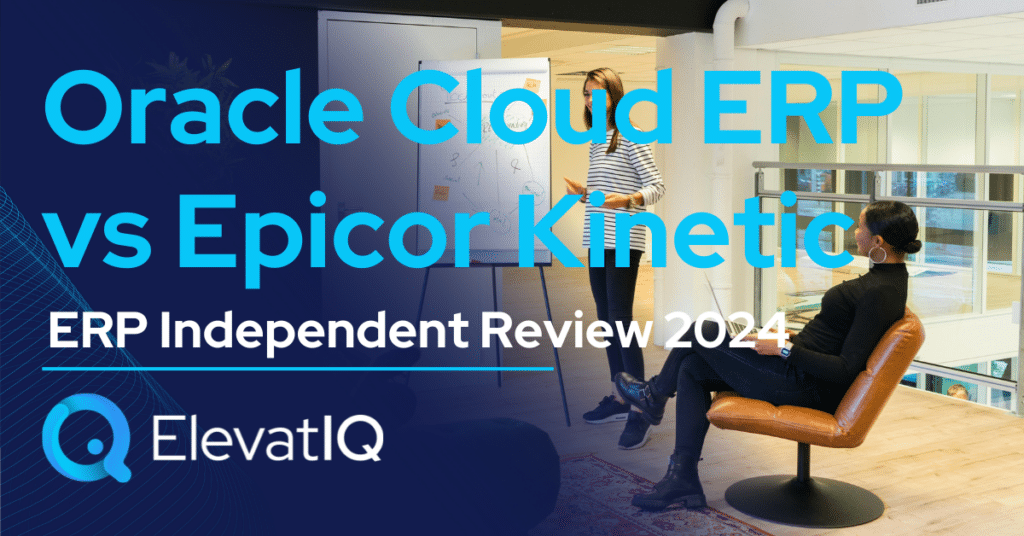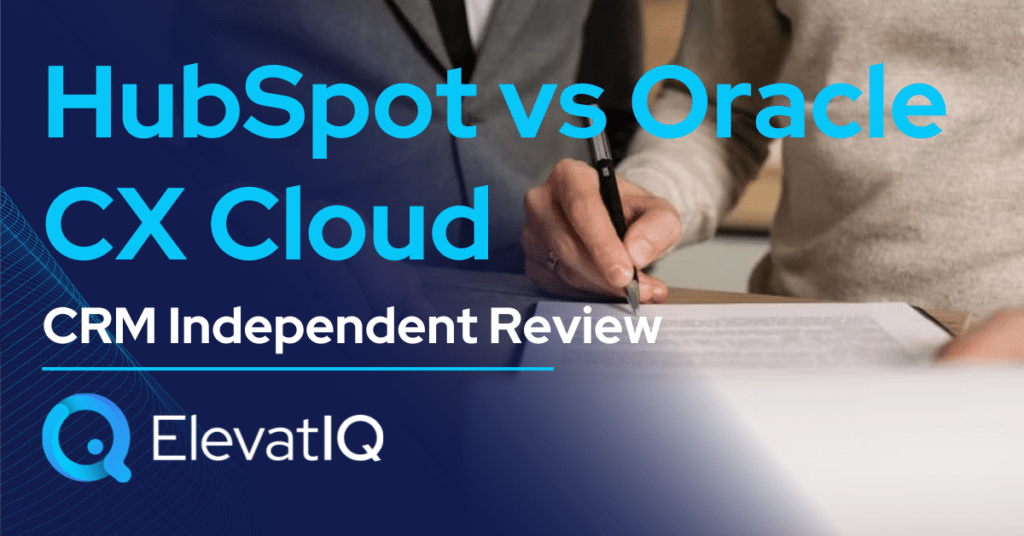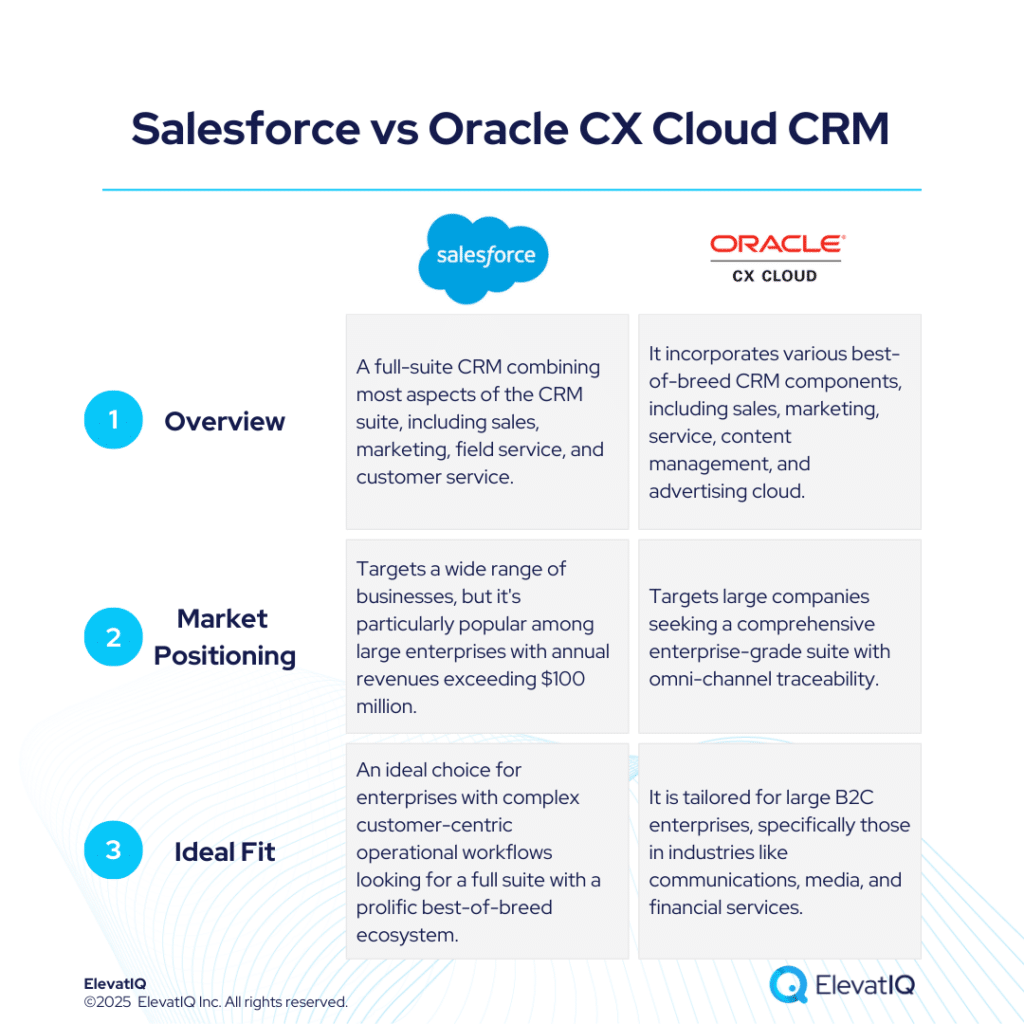Oracle ERP Cloud remains a top choice for large companies across diverse industries, particularly media, telecommunications, construction, energy, oil and gas, and healthcare. Despite the need for internal IT expertise, it is also suitable for companies with a need to integrate various third-party software systems. On the other hand, Infor CloudSuite LN surpasses entry-level ERP systems like Acumatica, Infor CSI, or NetSuite, by delivering mature capabilities for intricate manufacturing intertwined with distribution operations.
It is also successful in the upper mid-market, targeting the $250M – $750M revenue range. On the other hand, Oracle Cloud ERP particularly caters to companies needing ledger-level security and hierarchical financial reporting. Infor LN also provides a superior suite experience akin to SAP and Oracle, featuring enterprise-grade best-of-breed functionalities, including PLM, WMS, WFM, BI, and a supply chain collaboration platform. While Infor LN excels in discrete manufacturing and offers a robust suite experience, it does face certain challenges in specific scenarios such as with process-centric operations for companies.
Choosing between Oracle Cloud ERP vs Infor LN requires a detailed examination, and thus, this comparison offers valuable insights for ERP selection projects. Therefore, let’s explore further.
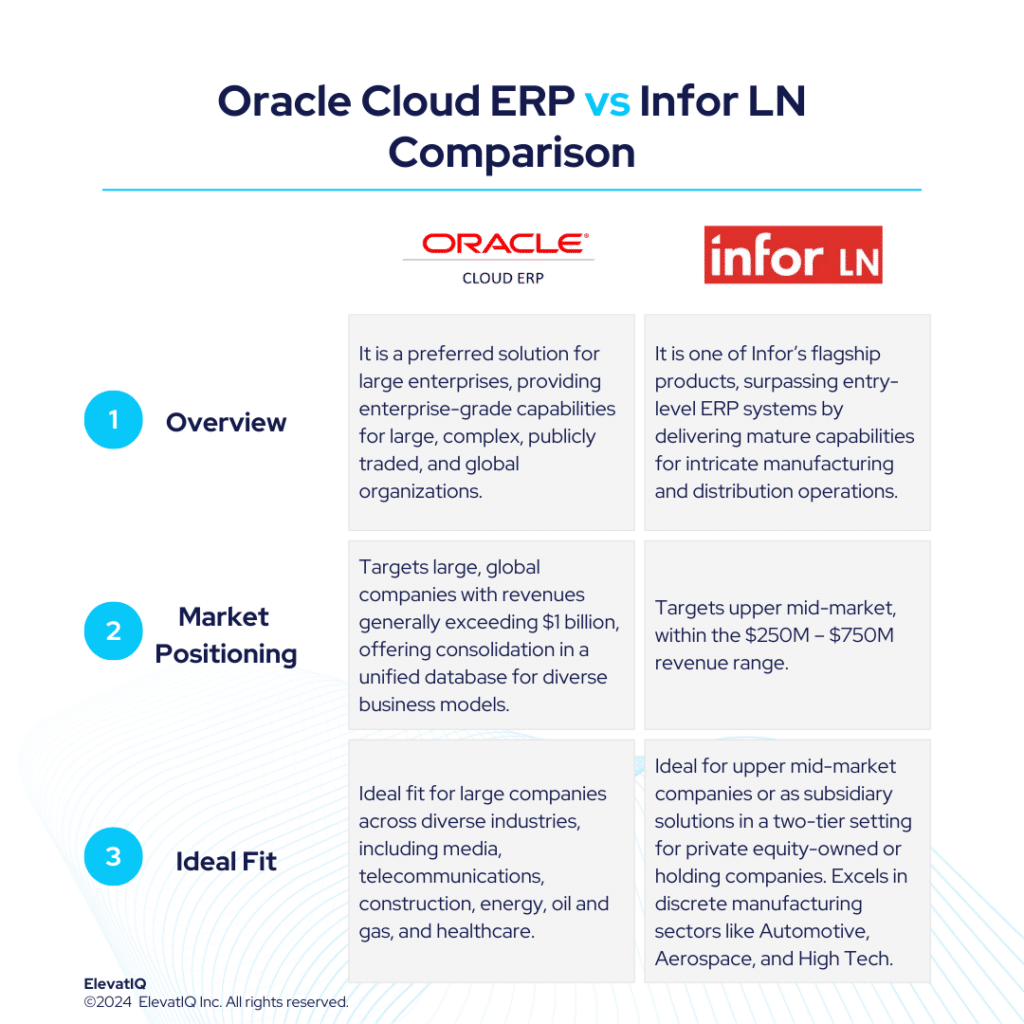

| Oracle Cloud ERP | Infor CloudSuite LN | |
| Started in | 2012 | 2006 (when Infor acquired BaaN) |
| Ownership by | Oracle | Koch Industries |
| No. of customers | 10000+ | 1000+ |
What is Oracle Cloud ERP?
Oracle ERP Cloud remains a top choice for large companies across diverse industries, including media, telecommunications, construction, energy, oil and gas, and healthcare (post-acquisition of Cerner). It is particularly suitable for organizations with substantial internal IT expertise and a requirement for integrating various proprietary and third-party software systems, such as patient claims management or utility billing solutions.
Oracle ERP Cloud is well-suited for global companies using it as their corporate financial ledger while employing other systems at the subsidiary level. Its robust financial capabilities cater to companies needing ledger-level security and hierarchical financial reporting, such as LOB, functions, or funds. Additionally, it seamlessly integrates a powerful HCM solution along with a natively integrated EPM solution.
Oracle ERP Cloud excels in risk management, advertising, and Cx cloud, particularly catering to industries like financial services and insurance. While it is a superior fit for service-centric industries, its success in product-centric industries has been limited. Often used as a corporate ledger, it might deploy another operationally rich solution at the subsidiary level in certain industries. Despite its strength for large enterprises, Oracle ERP Cloud is not the ideal choice for SMB customers.
What Is Infor CloudSuite LN?
Infor CloudSuite LN is a complete product suite to meet the needs of an enterprise particularly similar to Epicor, SAP, Oracle, or Microsoft. Infor is also perhaps the only vendor after the larger ones that has the capabilities to build best-of-breed architecture akin to SAP, Oracle, and Microsoft. In fact, Infor might have deeper capabilities than Microsoft in some areas with pre-integrated best-of-breed solutions such as Infor WFM and Nexus. Infor is also the only vendor that can provide depth in several industries while not struggling with the transactional processing requirements of large accounts.
Infor LN is particularly ideal for discrete manufacturing companies. It is successful in the upper mid-market, targeting the $250M – $750M revenue range. Positioned for companies surpassing entry-level ERP systems like Acumatica, Infor CSI, or NetSuite, this solution delivers mature capabilities particularly for intricate manufacturing intertwined with distribution operations. Infor LN also provides a superior suite experience akin to SAP and Oracle, featuring enterprise-grade best-of-breed functionalities, including PLM, WMS, WFM, BI, and a supply chain collaboration platform.
While Infor LN excels in discrete manufacturing and offers a robust suite experience, it does face certain challenges in specific scenarios such as with process-centric operations for companies. They might also include business operations such as plastic or chemicals as part of their automotive operations. Despite limitations in broader capabilities compared to other vanilla solutions, recent upgrades acknowledge its broader application in various automotive business models.
Oracle Cloud ERP vs Infor LN Comparison
Navigating the choice between Oracle Cloud ERP vs Infor LN is a significant decision for businesses particularly looking for operational efficiency and strategic alignment. Thus, this section delves into the comprehensive comparison of Oracle Cloud ERP vs Infor LN across various critical dimensions.
| Oracle Cloud ERP | Infor CloudSuite LN | |
| Global Operational Capabilities | Enterprise-grade multi-entity capabilities worldwide. | Has sufficient layers of financial hierarchies and global trade compliance functionality pre-baked with products. |
| Diverse Capabilities | Supports varied business models, may need third-party add-ons for industry specifics. | Limited focus on certain business models. |
| Best-of-breed Capabilities | Suite includes HCM, CPQ, WMS, RMS, TMS. | HCM, PLM, data lake, ERP, WMS, TMS, and advanced supply chain planning, are all pre-integrated with LN. |
| Last-mile Capabilities | Requires add-ons for micro-verticals. | Last-mile capabilities along with breadth of capabilities for diversified manufacturing business models. |
| Operational Functionalities | Deeper supply chain and logistics capabilities. | Infor LN is a legacy solution with limited cloud-native capabilities such as universal search, mobile experience, etc. |
| Integration Capabilities | Enterprise-grade integration suite with pre-integrated components. | Most tools that a manufacturer would require, such as HCM, PLM, data lake, ERP, WMS, TMS, and advanced supply chain planning, are all pre-integrated with LN. |
| Manufacturing Capabilities | Best value for focused manufacturing at subsidiary level. | This solution delivers mature capabilities for intricate manufacturing and distribution operations. |
| Pricing Model | Named-user based | Subscription-based |
| Key Modules | 1. Financial Management 2. Project Management 3. Procurement 4. Risk Management and Compliance 5. Enterprise Performance Management 6. Supply Chain and Manufacturing 7. ERP Analytics | 1. Financials 2. Human Resources 3. Manufacturing Management 4. Inventory Management 5. Purchasing Management 6. Quality Management 7. Sales Management 8. Product Technology |
Oracle Cloud ERP vs Infor LN Feature Comparison
Both platforms offer a plethora of features and functionalities designed to streamline business operations and enhance efficiency. In this feature comparison, we delve into particularly the distinct capabilities of Oracle Cloud ERP vs Infor LN across various critical dimensions, providing insights to aid businesses in making informed decisions regarding their ERP selection. Thus, this section discusses features under each of the following modules, particularly financial management, supply chain management, and manufacturing management.
Financial Management Comparison
In this section, we are discussing a detailed comparison of the financial management capabilities particularly offered by Oracle Cloud ERP vs Infor LN. By examining their respective strengths and functionalities, particularly in managing financial processes. Businesses can therefore gain valuable insights to determine the best-suited ERP solution for their financial management needs.
| Oracle Cloud ERP | Infor CloudSuite LN | ||
| Financial Management | General Ledger | Enterprise-grade ledgers to support multi-country operations at the global level with layers of sub-ledgers and complex closing process. | The General Ledger is the core component of Infor LN Financials, recording all transactions within the application that affect accounting. |
| Accounts Receivable and Accounts Payable | Support for complex, global AR and AP processes, including shared services. | AR manages customer invoices and credit, while AP handles supplier invoices and balance management. | |
| Cash Flow Management | Enterprise-grade capabilities for cash and treasury management. | Provides comprehensive forecasting, analysis, and Azure ML-based prediction of cash inflows and outflows. | |
| Currency Management | Enterprise-grade capabilities for currency management, including support for complex currency processes such as hedging. | The LN multicurrency systems allow a company to conduct accounting in multiple currencies, calculating and registering amounts in up to three currencies. | |
| Tax Management | Global and enterprise-grade tax management capabilities, with support for most countries in the world. | Tax reporting is part of financial accounting and is limited to one country, so LN’s tax handling in a multicompany structure is similar to that in a single company environment. |
Supply Chain Management Comparison
In this comparison, we explore and analyze the supply chain management capabilities of Oracle Cloud ERP vs Infor LN, shedding light particularly on their respective strengths and weaknesses.
| SAP S/4 HANA | Infor CloudSuite LN | ||
| Supply Chain Management | Warehouse Management | Streamlines warehouse operations, enhances inventory management, and ensures seamless multichannel fulfillment, end-to-end inventory visibility, and integration with advanced features for efficient resource allocation and workflow optimization. | Warehousing focuses on managing and replenishing goods within a warehouse, including tasks to report and analyze inventory movements. |
| Service Management | Ensures efficient and effective service delivery through features like service request management, incident handling, and knowledge management. | Manages the maintenance, repair, and overhaul of field-based and plant-based products, equipment, and systems. | |
| Inventory Management | Enables efficient management of goods flow, including inbound, within the warehouse, and outbound, while also supporting consigned inventory capabilities. | Can support complex inventory types including dedicated inventory masters for MRO or quality components for added granularity and control | |
| Purchase Order Management | Helps organizations digitally manage and process purchase orders for supply chain and procurement activities, improving efficiency and reducing overhead costs. | Can create and modify purchase orders for purchasing goods. | |
| Requisition Management | Ability to manage complex requisition management processes of globally complex enterprises. | Specifies nonsystem planned requirements for different types of items, including inventory items, cost items, and service items. |
Manufacturing Management Comparison
In this comparison, we explore and analyze the manufacturing management capabilities of Oracle Cloud ERP vs Infor LN, shedding light, particularly on their respective strengths and weaknesses.
| Oracle Cloud ERP | Infor CloudSuite LN | ||
| Manufacturing Management | Production Planning | Offers production planning capabilities including capacity planning, MRP, shop floor control, and demand planning. | One of the most robust production planning capabilities including advanced planning and scheduling capabilities for diverse manufacturing operations |
| BOM and Routing | Allows you to define lists of components associated with a parent item and outlines step-by-step operations required for manufacturing an assembly. | It is stored as general item data for LN in Item Production Data (IPD). | |
| Advanced Planning and Scheduling | Plans all supply chain facilities, supporting both short-term detailed scheduling and long-term aggregate planning within a single plan. It also considers finite capacity constraints and offers holistic optimization capabilities. | Stores scheduling information for projects, allowing you to define project plans along with associated activities and milestones. |
Pros of Oracle Cloud ERP vs Infor LN
When evaluating ERP solutions, understanding the distinct advantages of Oracle Cloud ERP vs Infor LN is crucial. In this section, we are particularly exploring the strengths of Oracle Cloud ERP vs Infor LN across various dimensions. Thus, shedding light on their respective capabilities and functionalities.
| Oracle Cloud ERP | Infor CloudSuite LN |
| The product architecture supports the needs of large, complex financial organizations with deep sub-ledger hierarchies. | Ideal for upper mid-market companies or as subsidiary solutions in a two-tier setting for private equity-owned or holding companies. |
| Oracle Cloud ERP has an ecosystem of experienced consultants capable of handling the architecture of such complex enterprises. | It can support the most complex manufacturing business models, WBS-centric manufacturing, or support for attributes with MRP planning. |
| The embedded HCM and CRM processes are suitable for large non-profit organizations. The P2P workflows are friendlier for the indirect procurement needs of non-profit organizations. | Most tools that make-to manufacturer would require, such as HCM, PLM, data lake, ERP, WMS, TMS, and advanced supply chain planning, are all pre-integrated with LN. |
| The workload Oracle Cloud ERP is designed to process millions of GL entries per hour. | While most smaller solutions might require ad-hoc arrangements for global financial operations, Infor CloudSuite LN has them natively built. |
Cons of Oracle Cloud ERP vs Infor LN
Just like recognizing strengths is important, it’s also crucial to weigh the specific drawbacks of Oracle Cloud ERP vs Infor LN. Therefore, in this section, we will delve into the limitations and challenges associated with Oracle Cloud ERP vs Infor LN across various operational and financial dimensions.
| Oracle Cloud ERP | Infor CloudSuite LN |
| Transactional and financial traceability may not be intuitive for large enterprises. | The limited focus on certain business models poses the risk of requiring other ERP systems to support complex and diverse business operations such as process manufacturing or metal-centric A&D companies. |
| Data model and translations could overwhelm companies transitioning from QuickBooks. | Private equity and holding companies requiring global solutions with a tier-2 solution at the subsidiary level might not be the best use of Infor LN’s strengths. |
| Complex MRP runs might pose challenges for costing and scheduling. | Infor LN is a legacy solution with limited cloud-native capabilities such as universal search, mobile experience, etc |
| Customization and configuration may take longer due to unnecessary functionality. | The consulting base and marketplaces are virtually non-existent for Infor LN. |
| P2P processes, CPQ, and manufacturing capabilities may not suit product-centric organizations. | The integration of Infor LN with MES enhances its capabilities, particularly in complex manufacturing processes. |
| Limited last-mile functionality for quality and compliance, requiring add-ons or custom development. | Verticals such as automotive manufacturing demand deeper integration of PLM, CAD, and vendor portals to effectively manage their unique processes. |
Conclusion
In conclusion, both Oracle Cloud ERP and Infor LN offer robust and comprehensive ERP solutions tailored to distinct market segments and operational needs. Oracle Cloud ERP is a premier choice for large enterprises with complex financial and operational requirements, particularly excelling in industries such as media, telecommunications, construction, energy, oil and gas, and healthcare. Its strength lies in its extensive financial management capabilities, global scalability, and integration with various third-party systems, making it ideal for organizations with substantial IT expertise and global operations. However, it may not be the best fit for small to mid-sized businesses due to its complexity and cost.
On the other hand, Infor LN targets the upper mid-market, specifically companies within the $250M – $750M revenue range, and excels in discrete manufacturing sectors like automotive, aerospace, and high-tech. It provides a mature suite experience with pre-integrated best-of-breed functionalities such as PLM, WMS, WFM, and advanced supply chain planning. While it faces challenges in process-centric operations and lacks some cloud-native capabilities, Infor LN remains a strong contender for manufacturing and distribution operations. Ultimately, the choice between Oracle Cloud ERP vs Infor LN should be guided by the specific operational needs, industry requirements, and strategic goals of the organization. Also, seeking assistance from an independent ERP consultant can significantly aid the decision-making process, offering specialized advice and direction tailored to the specific needs of the business.



